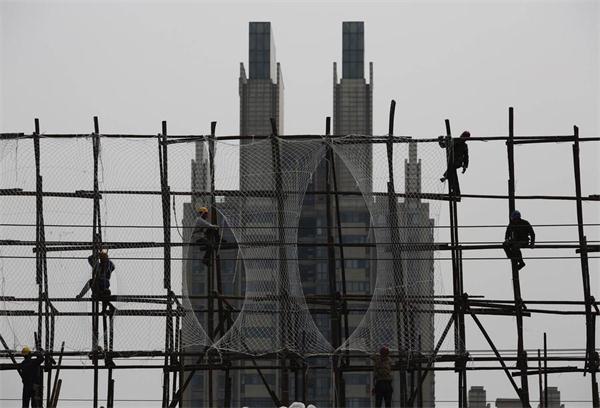Market confidence key to China's economic future
Updated: 2015-08-25 08:06
By Andrew Sheng / Xiao Geng(China Daily)
|
||||||||
 |
|
Labourers work on the scaffolding of a construction site for a new residential building in Beijing, May 6, 2014. [Photo/IC] |
Secular stagnation is looming worldwide, and China is no exception. Globally, the unprecedented monetary and fiscal stimulus following the 2008 financial crisis has caused debt, equity and property prices to peak, even as trade and investment decline. All of this has depressed demand, economic growth and inflation. For China, this is complicating official efforts to boost the role of market forces in shaping economic outcomes. Will the authorities' latest move - devaluation of the renminbi - be enough to turn the tide?
China's leaders have shown a commitment to ceding some control over the economy, signaling to businesses that they must adjust to a "new normal" of slower output gains as the country pursues structural reforms aimed at establishing a more sustainable growth model. But rising risk - reflected in the recent plunge in China's stock market - has compelled the government to step in to limit the fallout. And, with policy uncertainty and market volatility driving Chinese businesses to sit on, rather than invest, large cash balances, the pressure of secular stagnation is growing more severe.
China's situation, while far from dire, is certainly challenging. Though real annual GDP growth seems to have stabilized around 7 percent, almost all key economic indicators - such as nominal GDP, fixed-asset investment, floor space under construction, nominal retail sales, auto sales, electricity output, railway cargo, and iron ore imports - are well below their four-year growth average.
When China's problems became more widely apparent, investor confidence sank - and so did the stock market. China's government then stepped in with measures to stabilize equity prices. But such interventions inevitably involve a redistribution of market losses, raising the question of whether scarce State resources would be better allocated toward stimulating the real economy, rather than the financial sector. And, because state intervention puts a floor beneath market participants' losses, it undermines the effectiveness of conventional macro policies.
Investors understand that the State can and will intervene to ease temporary market instability. But market confidence hinges on what is sustainable in the longer term. If China is to avoid the deflation trap, revive investment, bolster competitiveness and accelerate long-term growth, it must continue its quest to foster the animal spirits of innovation and entrepreneurship.
China's long-term future hinges on its ability to boost market confidence. People will not be inspired to invest more in China if they don't believe the economy will eventually enable them to turn a profit. That is why it is so important that China's leaders not only promote domestic consumption to offset stagnation elsewhere, but also ensure that state and market forces work reliably in concert.
To some extent, the authorities seem prepared to do what it takes. Devaluing the renminbi by about 2 percent against the US dollar - the biggest one-day move since the renminbi officially eliminated its dollar peg - should give market forces more influence over the tightly controlled currency, while giving Chinese businesses a competitive edge in foreign markets.
As recent bitter experience has shown, the government cannot continue to stimulate the economy by pursuing debt-financed investments. It is time to give private sector players the tools they need to lead the economy toward more sustainable prosperity.
Andrew Sheng is distinguished fellow of Asia Global Institute at the University of Hong Kong and a member of the UNEP Advisory Council on Sustainable Finance, and Xiao Geng, director of the IFF Institute, is a professor at the University of Hong Kong and a fellow of the Asia Global Institute at HKU.
Project Syndicate
- Global health entering new era: WHO chief
- Brazil's planning minister steps aside after recordings revelation
- Vietnam, US adopt joint statement on advancing comprehensive partnership
- European border closures 'inhumane': UN refugee agency
- Japan's foreign minister calls A-bombings extremely regrettable
- Fukushima impact unprecedented for oceans: US expert

 Stars of Lijiang River: Elderly brothers with white beards
Stars of Lijiang River: Elderly brothers with white beards
 Wealthy Chinese children paying money to learn British manners
Wealthy Chinese children paying money to learn British manners
 Military-style wedding: Fighter jets, grooms in dashing uniforms
Military-style wedding: Fighter jets, grooms in dashing uniforms
 Striking photos around the world: May 16 - May 22
Striking photos around the world: May 16 - May 22
 Robots help elderly in nursing home in east China
Robots help elderly in nursing home in east China
 Hanging in the air: Chongqing holds rescue drill
Hanging in the air: Chongqing holds rescue drill
 2.1-ton tofu finishes in two hours in central China
2.1-ton tofu finishes in two hours in central China
 Six things you may not know about Grain Buds
Six things you may not know about Grain Buds
Most Viewed
Editor's Picks

|

|

|

|

|

|
Today's Top News
Liang avoids jail in shooting death
China's finance minister addresses ratings downgrade
Duke alumni visit Chinese Embassy
Marriott unlikely to top Anbang offer for Starwood: Observers
Chinese biopharma debuts on Nasdaq
What ends Jeb Bush's White House hopes
Investigation for Nicolas's campaign
Will US-ASEAN meeting be good for region?
US Weekly

|

|









